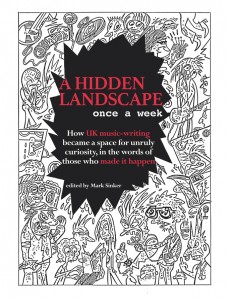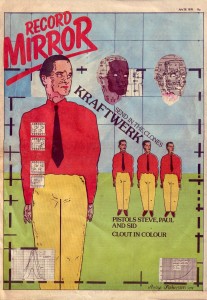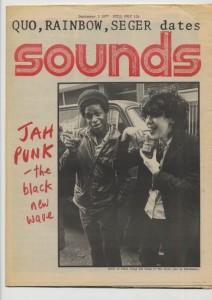“During the Conservative government of Edward Heath there were five declarations of emergency under this Act [viz the Emergency Powers Act 1920], by far the most any government. The first was in July 1970 over a dockers strike, the second in December 1970 over an electricians strike, the third in February 1972 over a miners strike, the fourth in August 1972 over another dockers strike and the fifth time in October 1973, which lasted for four months”
 So for last 18 months, my plan had been to launch the kickstarter for the book of the conference I ran at Birkbeck on the politics of UK rockwriting (1968-85). That’s a mock-up of the cover on the left (illustrations by the marvellous Savage Pencil): you can click on it to see a larger version, but if you don’t the title and subtitle read A HIDDEN LANDSCAPE ONCE A WEEK: how UK music-writing became a space for unruly curiousity, in the words of those who made it happen. Originally I had the kickstarter launch scheduled for May, exactly 12 months on from the symposium itself — but there were a lot of things to get ready, and, well, events intervened (it went live on Monday 27 June, just four days after the results of the eurovote sent everything in the UK into spiralling chaos). No one’s said so directly — most people have been very supportive — but if someone were to suggest it was frivolous or decadent or impertinent to be promoting such a project during such a crisis, well, I wouldn’t be entirely startled. And I wouldn’t feel they were entirely wrong.
So for last 18 months, my plan had been to launch the kickstarter for the book of the conference I ran at Birkbeck on the politics of UK rockwriting (1968-85). That’s a mock-up of the cover on the left (illustrations by the marvellous Savage Pencil): you can click on it to see a larger version, but if you don’t the title and subtitle read A HIDDEN LANDSCAPE ONCE A WEEK: how UK music-writing became a space for unruly curiousity, in the words of those who made it happen. Originally I had the kickstarter launch scheduled for May, exactly 12 months on from the symposium itself — but there were a lot of things to get ready, and, well, events intervened (it went live on Monday 27 June, just four days after the results of the eurovote sent everything in the UK into spiralling chaos). No one’s said so directly — most people have been very supportive — but if someone were to suggest it was frivolous or decadent or impertinent to be promoting such a project during such a crisis, well, I wouldn’t be entirely startled. And I wouldn’t feel they were entirely wrong.
 Despite this, I still think it’s right to carry on: and here’s why. The book will be an anthology — meaning that a variety of voices will speak (it will contain extracts from the panels on the day, with additional essays from those involved). It is a regathering of people involved in an informal, improvised cultural space that came into being at some point in the 60s (perhaps even earlier), coalescing around 1970 out the counterculture and other existing sources, some radical, some fannish — which existed in real time for some years, with ripples that continued to travel long after that. In its multiform, provocative, naive way, it was something that stood somewhat athwart the grim turbulences of the 70s, even if (from time to time) it also reacted to them and expressed them. It was about possibility, and about community: about how a community gets to define itself and to move out into the wider world.
Despite this, I still think it’s right to carry on: and here’s why. The book will be an anthology — meaning that a variety of voices will speak (it will contain extracts from the panels on the day, with additional essays from those involved). It is a regathering of people involved in an informal, improvised cultural space that came into being at some point in the 60s (perhaps even earlier), coalescing around 1970 out the counterculture and other existing sources, some radical, some fannish — which existed in real time for some years, with ripples that continued to travel long after that. In its multiform, provocative, naive way, it was something that stood somewhat athwart the grim turbulences of the 70s, even if (from time to time) it also reacted to them and expressed them. It was about possibility, and about community: about how a community gets to define itself and to move out into the wider world.
The kickstarter is here: and what I say about it on that page is this (click through for further detail, and to support it to make it happen):
Once upon a time — for a surprisingly long time— the UK music-press was a lot more than just the place to catch up with singles or album release news, with interviews with chart-topping figures and the antics of gobby rockstars. Week on week in its heyday — the mid 60s to the early 80s — a young reader could also go to it to find out about everything from comics to cult films to radical politics, as well as an extremely wide range of non-chart musics from all over the world. Hiding in plain sight, it was the communal improvisation of ways to process an unprecedented tumult from every quarter, of new sounds and dances, startling ideas and visions all battling for attention. It took place in such high-street titles as NME, Melody Maker, Sounds, Record Mirror, Echoes, Street Life, Let It Rock, Zigzag, Black Music; but it had fermented in the undergrounds — Oz, IT, Frendz, Ink — and a significant alt/free/listings press including Time Out, City Limits, the anti-racist agit-prop paper Temporary Hoarding, and the redoubtable feminist magazine Spare Rib. As well, from the mid-70s, there was a burgeoning underfelt of fanzines, notably Nick Kimberley and Penny Reel’s legendary reggae zine Pressure Drop, plus Bam Balam, Sniffin’ Glue, Ripped and Torn, London’s Burning, London’s Outrage, Out There, and many many more.
 It would be absurd to argue that its ideals — insofar as it even understood them clearly — have come to be irrevocably enacted: incorrect, if sometimes tempting, in the late 90s; simply fatuous in the light of recent weeks, when everything that it was not has broken back hard against it. It was always fragile: a serendipity, a moment. I want to argue that it was something more. That something useful to us right now can be drawn out of it. I’m not even sure yet what this is — I have ideas, which I might write more about, but for now I just want to make it possible to re-open the conversation.
It would be absurd to argue that its ideals — insofar as it even understood them clearly — have come to be irrevocably enacted: incorrect, if sometimes tempting, in the late 90s; simply fatuous in the light of recent weeks, when everything that it was not has broken back hard against it. It was always fragile: a serendipity, a moment. I want to argue that it was something more. That something useful to us right now can be drawn out of it. I’m not even sure yet what this is — I have ideas, which I might write more about, but for now I just want to make it possible to re-open the conversation.
“To articulate what is past does not mean to recognize ‘how it really was’. It means to take control of a memory, as it flashes in a moment of danger… The only writer of history with the gift of setting alight the sparks of hope in the past, is the one who is convinced of this: that not even the dead will be safe from the enemy, if he is victorious. And this enemy has not ceased to be victorious.”
